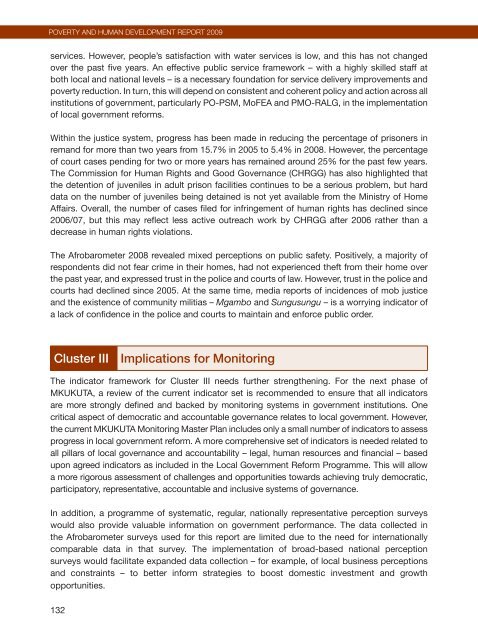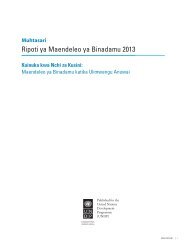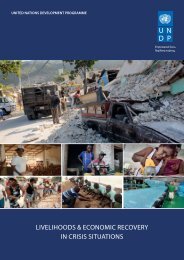Poverty and Human Development Report 2009 - UNDP in Tanzania
Poverty and Human Development Report 2009 - UNDP in Tanzania
Poverty and Human Development Report 2009 - UNDP in Tanzania
You also want an ePaper? Increase the reach of your titles
YUMPU automatically turns print PDFs into web optimized ePapers that Google loves.
POVERTY AND HUMAN DEVELOPMENT REPORT <strong>2009</strong><br />
services. However, people’s satisfaction with water services is low, <strong>and</strong> this has not changed<br />
over the past five years. An effective public service framework – with a highly skilled staff at<br />
both local <strong>and</strong> national levels – is a necessary foundation for service delivery improvements <strong>and</strong><br />
poverty reduction. In turn, this will depend on consistent <strong>and</strong> coherent policy <strong>and</strong> action across all<br />
<strong>in</strong>stitutions of government, particularly PO-PSM, MoFEA <strong>and</strong> PMO-RALG, <strong>in</strong> the implementation<br />
of local government reforms.<br />
With<strong>in</strong> the justice system, progress has been made <strong>in</strong> reduc<strong>in</strong>g the percentage of prisoners <strong>in</strong><br />
rem<strong>and</strong> for more than two years from 15.7% <strong>in</strong> 2005 to 5.4% <strong>in</strong> 2008. However, the percentage<br />
of court cases pend<strong>in</strong>g for two or more years has rema<strong>in</strong>ed around 25% for the past few years.<br />
The Commission for <strong>Human</strong> Rights <strong>and</strong> Good Governance (CHRGG) has also highlighted that<br />
the detention of juveniles <strong>in</strong> adult prison facilities cont<strong>in</strong>ues to be a serious problem, but hard<br />
data on the number of juveniles be<strong>in</strong>g deta<strong>in</strong>ed is not yet available from the M<strong>in</strong>istry of Home<br />
Affairs. Overall, the number of cases filed for <strong>in</strong>fr<strong>in</strong>gement of human rights has decl<strong>in</strong>ed s<strong>in</strong>ce<br />
2006/07, but this may reflect less active outreach work by CHRGG after 2006 rather than a<br />
decrease <strong>in</strong> human rights violations.<br />
The Afrobarometer 2008 revealed mixed perceptions on public safety. Positively, a majority of<br />
respondents did not fear crime <strong>in</strong> their homes, had not experienced theft from their home over<br />
the past year, <strong>and</strong> expressed trust <strong>in</strong> the police <strong>and</strong> courts of law. However, trust <strong>in</strong> the police <strong>and</strong><br />
courts had decl<strong>in</strong>ed s<strong>in</strong>ce 2005. At the same time, media reports of <strong>in</strong>cidences of mob justice<br />
<strong>and</strong> the existence of community militias – Mgambo <strong>and</strong> Sungusungu – is a worry<strong>in</strong>g <strong>in</strong>dicator of<br />
a lack of confidence <strong>in</strong> the police <strong>and</strong> courts to ma<strong>in</strong>ta<strong>in</strong> <strong>and</strong> enforce public order.<br />
Cluster III Implications for Monitor<strong>in</strong>g<br />
The <strong>in</strong>dicator framework for Cluster III needs further strengthen<strong>in</strong>g. For the next phase of<br />
MKUKUTA, a review of the current <strong>in</strong>dicator set is recommended to ensure that all <strong>in</strong>dicators<br />
are more strongly def<strong>in</strong>ed <strong>and</strong> backed by monitor<strong>in</strong>g systems <strong>in</strong> government <strong>in</strong>stitutions. One<br />
critical aspect of democratic <strong>and</strong> accountable governance relates to local government. However,<br />
the current MKUKUTA Monitor<strong>in</strong>g Master Plan <strong>in</strong>cludes only a small number of <strong>in</strong>dicators to assess<br />
progress <strong>in</strong> local government reform. A more comprehensive set of <strong>in</strong>dicators is needed related to<br />
all pillars of local governance <strong>and</strong> accountability – legal, human resources <strong>and</strong> f<strong>in</strong>ancial – based<br />
upon agreed <strong>in</strong>dicators as <strong>in</strong>cluded <strong>in</strong> the Local Government Reform Programme. This will allow<br />
a more rigorous assessment of challenges <strong>and</strong> opportunities towards achiev<strong>in</strong>g truly democratic,<br />
participatory, representative, accountable <strong>and</strong> <strong>in</strong>clusive systems of governance.<br />
In addition, a programme of systematic, regular, nationally representative perception surveys<br />
would also provide valuable <strong>in</strong>formation on government performance. The data collected <strong>in</strong><br />
the Afrobarometer surveys used for this report are limited due to the need for <strong>in</strong>ternationally<br />
comparable data <strong>in</strong> that survey. The implementation of broad-based national perception<br />
surveys would facilitate exp<strong>and</strong>ed data collection – for example, of local bus<strong>in</strong>ess perceptions<br />
<strong>and</strong> constra<strong>in</strong>ts – to better <strong>in</strong>form strategies to boost domestic <strong>in</strong>vestment <strong>and</strong> growth<br />
opportunities.<br />
132





